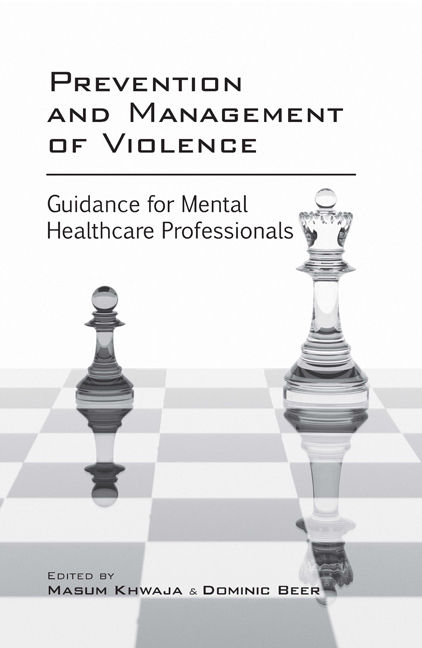Book contents
- Frontmatter
- Dedication
- Contents
- Abbreviations
- List of boxes and tables
- Working group
- Executive summary and recommendations
- 1 Legislation relevant to the management of violence by persons with mental disorders
- 2 Safeguarding vulnerable adults and children exposed to violence
- 3 Risk assessment and management
- 4 Risk prevention and non-pharmacological management of violence in acute settings
- 5 Use of medication and ECT in the management of violence
- 6 Post-incident management
- 7 Management of the risk of violence in the community
- 8 Management of violence in older adults
- 9 Management of violence in people with intellectual disability
- 10 Management of violence in prisons
- 11 Liaison with the police, Crown Prosecution Service and MAPPA
- 12 Information-sharing with victims of crime committed by persons with mental disorders
- 13 Clinical governance
- Appendix Organisations that victims of crime can contact
- Index
3 - Risk assessment and management
- Frontmatter
- Dedication
- Contents
- Abbreviations
- List of boxes and tables
- Working group
- Executive summary and recommendations
- 1 Legislation relevant to the management of violence by persons with mental disorders
- 2 Safeguarding vulnerable adults and children exposed to violence
- 3 Risk assessment and management
- 4 Risk prevention and non-pharmacological management of violence in acute settings
- 5 Use of medication and ECT in the management of violence
- 6 Post-incident management
- 7 Management of the risk of violence in the community
- 8 Management of violence in older adults
- 9 Management of violence in people with intellectual disability
- 10 Management of violence in prisons
- 11 Liaison with the police, Crown Prosecution Service and MAPPA
- 12 Information-sharing with victims of crime committed by persons with mental disorders
- 13 Clinical governance
- Appendix Organisations that victims of crime can contact
- Index
Summary
Risk assessment forms an integral part of psychiatric practice. It covers a wide range of potential harms to which patients may be exposed, or which they may pose to themselves or others. Risk assessment may be defined as the systematic collection of information from all available sources to estimate the degree to which harm (to self or others) is likely at some point in time (O'Rourke & Bird, 2001). It begins at first contact with a patient and needs to be reviewed regularly in light of changing circumstances and new information; it is a dynamic process. Risk assessment is meaningless, however, unless it is linked with a management plan which aims to reduce the likelihood that harm will occur, or to reduce its severity if it does occur. Risk assessment and management should be an integrated process.
In the past 20 years the concept of ‘dangerousness’ has been left behind as it is increasingly recognised that risk to others is not a trait inherent in a patient, but the product of a range of interacting factors. Some of these factors are patient-related; some are related to the people around the patient, some to the environment and some to chance. When a mental health professional recognises a significant risk of violence, they are under a professional obligation to take steps to manage and reduce it by all practicable means (Department of Health, 2008).
There is, however, a danger in adopting an overly risk-oriented and risk-averse approach to mental healthcare. The association between certain mental disorders and violent behaviour is established; however, the spectrum of risk and the relative rarity of the most serious violence must also be considered (National Confidential Inquiry into Suicide and Homicide by People with Mental Illness, 2011). A Royal College of Psychiatrists’ briefing document offers a helpful commentary on moving beyond a ‘culture of blame’ (Morgan, 2007).
In this chapter, we outline current views on the principles of assessing and managing the risk of violence, as well as some of the practical implications. This is not intended to be exhaustive and readers are encouraged to refer to the publications cited for further guidance.
- Type
- Chapter
- Information
- Prevention and Management of ViolenceGuidance for Mental Health Professionals, pp. 13 - 17Publisher: Royal College of PsychiatristsFirst published in: 2017

